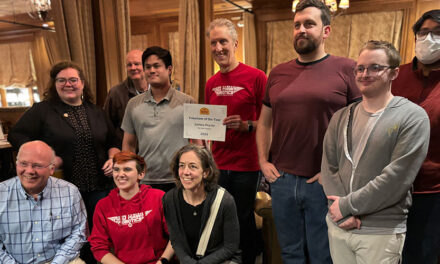Published in the September 7, 2018 edition
MELROSE — Gail Infurna is one of a bipartisan group of six mayors asking their counterparts across the state to oppose a nurse staffing question on November’s ballot, saying they’re concerned about its impact on local hospital finances.
Infurna of Melrose, Paul Heroux of Attleboro, Robert Hedlund of Weymouth, Jon Mitchell of New Bedford, Donna Holaday of Newburyport and Mark Hawke of Gardner wrote in a letter last month that the proposal to mandate minimum nurse staffing levels would come with a “staggering price tag” that would “force some of our most vulnerable community hospitals to close” and strain municipal services.
“To underscore the negative impact on our municipal operations, consider what would happen if an emergency department reaches its full legal allowance of patients for the number of nurses on duty,” the letter said. “Under the new law, a hospital would not be able to admit any more patients, forcing walks-ins and ambulances to search for another hospital that could be more than 10-20 miles away; wasting valuable time in life-and-death situations. For communities with municipal ambulance services, this will be an added financial and resource burden for our public safety officials.”
A hospital that does not meet certain staffing levels as dictated by Question 1 on the November 6 ballot would be subject to fines.
Pointing to a recent study published in the Western Journal of Emergency Medicine, the backers of Question 1 have said that excessive patient assignments and lower staffing levels in emergency departments are detrimental to patient care, leading to longer wait times and an increased likelihood patients will leave without being seen.
An eleventh hour compromise brokered by Needham Democrat Rep. Denise Garlick avoided a nurses staffing ballot question in 2014 and instituted mandatory one nurse per patient staffing ratios in internal care units.
Four years later, the Massachusetts Nurses Association was more determined to see a similar ballot question placed before voters. Officials at the union were not seeking a compromise, they said.
Interest groups on both sides of the issue have already touted studies and appealed directly to the public in attempts to steer voters one way or the other.
The Coalition to Protect Patient Safety, a ballot committee, has the backing of the Massachusetts Health and Hospital Association, which estimated the proposal could add roughly $1 billion per year in new costs.
The Committee to Ensure Safe Patient Care, which claims mandatory staffing levels are needed to improve care, has financial support from the Massachusetts Nurses Association.
“This has been a long time coming, and nurses have been advocating for a Yes for patient safety for decades,” Donna Kelly-Williams, a registered nurse at the Cambridge Hospital Birth Center and president of the Massachusetts Nurses Association, said in a statement Monday. “As an active bedside nurse, I see it every day on the hospital floor and I hear it every day from my colleagues across the state. It’s time for hospital executives to put patient care over profits.”
“This ballot question is important to me because I am a nurse and worked for 25 years as a clinical staff nurse,” Gail Infurna said recently. “This is my world. This ballot question as proposed will not guarantee patient safety. The way the question is worded, hospitals could assign nurses to departments that are not their specialty in order to meet the staffing requirement. This would satisfy the letter of the law but would not enhance patient care.”
The mayor also pointed to evidence that does not support the case being made by Question 1 backers.
“There are a number of studies from California, which does have mandated staff ratios, that show no improvement in quality of care, and in some cases, giving nurses assignments outside their specialties resulted in poor outcomes,” Infurna explained. “Nurses know best how to care for their patients. We are trained professionals and should be allowed to use our best judgement, based on our knowledge and experience.”
The mayor, asked about any negative impact Question 1 may have on municipal operations, said, “We are fortunate to have a community hospital right here in our city. MelroseWakefield Healthcare, as well as many other neighboring community hospitals, provides quality programs, support groups, and educational opportunities for our residents. It is also the largest employer in Melrose, and therefore an important part of our local economy.
“The city works closely with the hospital with regard to the ambulance service. In addition, the emergency room and behavior health services are vital to our population. Mandatory staffing would shift resources away from some of those programs. In some cases, the City of Melrose would have to step in to replace those services, and in others, we might simply have to do without.”
Infurna was asked whether MelroseWakefield Hospital would be forced to close if Question 1 passes in November.
She said the hospital’s parent company “estimates that if Question 1 passes, costs would go up by $11 million per year. Whether that additional cost would force the hospital to close is an open question, but it certainly could require them to reduce services or increase the price of medical care.”
The mayor, answering those who feel nurse staffing levels need to be addressed, said, “I get it…the nurse-patient ratio is often far from perfect. This is usually not a matter of scheduling, however, so much as call outs and unexpected absences. This law doesn’t fix that. What’s more, there is a shortage of clinical nurses: I understand that there are 1,700 nursing vacancies in the state right now, and hospitals can’t even fill those. How will they be able to hire the roughly 7,000 nurses who will be required if Question 1 passes?”
Infurna concluded: “Everybody wants and deserves good care for themselves and their loved ones when they are in the hospital, but Question 1 doesn’t guarantee that. It is an overly simple solution to a complicated problem.”
— Katie Lannan of the State House News Service contributed to this report.




